Three weeks before the September 27 German federal election, the IG Metall, Germany’s biggest trade union with 2.3 million members, has gone to great lengths and invested considerable money to stage an election rally for the Social Democratic Party (SPD). A national day of action on Saturday, September 5, which began with a rally of trade union youth at the Opernplatz in Frankfurt-Main, culminated in a megashow at the Frankfurt Commerzbank Arena, with music, flags, beer and lots of noise.
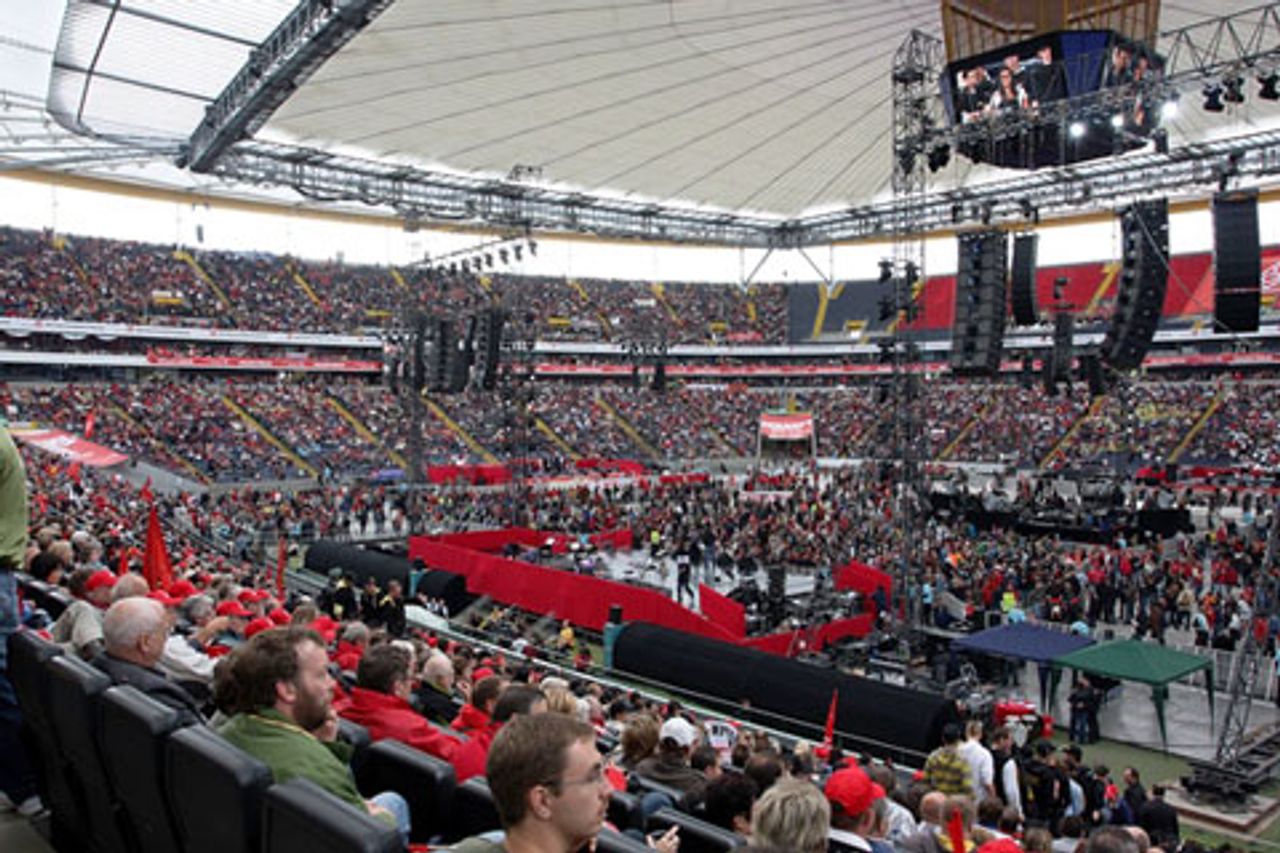 The rally in Frankfurt-Main
The rally in Frankfurt-MainOutside the stadium one of the electoral candidates of the Socialist Equality Party (Partei für Soziale Gleicheit, PSG), Dietmar Gaisenkersting, addressed those attending the rally by megaphone. He confronted them with a balance sheet of the last 10 years in which the SPD has participated in or led the government. He pointed out that at the end of this decade more than 6 million citizens are unemployed while 6.5 million are employed in cheap labour jobs. One fifth of all German children live in poverty.
The turnout of around 35,000 was less than the union had expected. On the day of the rally a spokesman had declared that the union anticipated 50,000 would participate.
The union “day of action” had more in common with a big street party. On their arrival at the Opernplatz, the young trade unionists were greeted with gratis T-shirts, whistles and free beer. The music droning from loudspeakers was so loud as to make any reasonable conversation impossible. It was obvious the organizers had no interest in encouraging any sort of political discussion.
Later in the stadium, the speeches were kept short and the emphasis was on entertainment. Amongst those appearing were Irish pop star Bob Geldof, the pop group “Hope” and rapper Sammy Deluxe. According to the local radio station, the IG Metall had paid out 1 million euros to rent the stadium for a day.
In his speech to participants the chairman of the IG Metall, Berthold Huber, declared that the union was not making an explicit recommendation regarding which party to vote for in the forthcoming federal election. He did emphasize, however, that in the view of the union a future coalition of the conservative Christian Democratic Union (CDU) with the free-market Free Democratic Party (FDP) would be “the worst of all possible government constellations for the next four years… Those responsible for the finance crisis should not emerge as those who profit from the crisis.”
He called upon workers to ensure that at the election neo-liberal politics be consigned to the “rubbish heap of history.” In this regard Huber deliberately made an exception of the SPD and expressly welcomed the purely tactical promise made by SPD leader, Frank-Walter Steinmeier, to invest in environment, traffic and education and create up to 4 million new jobs.
Huber made no mention of the fact that the government at the bidding of its SPD finance minister, Peer Steinbrück, recently agreed that a “debt brake” be built into the German constitution. The measure, which limits the amount of debt the government can accumulate, was agreed by all of the parties in the German parliament and means that the next government—irrespective of its composition—will be compelled to enforce drastic austerity policies in order to recover the billions which the state has awarded to German banks during the past year. The “debt brake” makes a mockery of all the promises made in the election campaign by the SPD.
Huber also made no mention of the intervention by the German army in Afghanistan, despite the fact that the latest NATO atrocity in that country, which claimed the lives of dozens of civilians, was initiated by a German army officer. The SPD is a firm supporter of the Afghanistan war.
Huber told the press that the event held Saturday was a new form of activity for the IG Metall. “It is not about replacing the street with an arena, but rather using both the arena and the street,” Huber explained. The reality looks rather different. While the IG Metall is prepared to spend millions from contributions paid by its members for a glorified pop concert, it has refused to organize any significant labour struggle for years.
The IG Metall also has no objection to a continuation of the current grand coalition government of the SPD and conservative parties. This became clear at the press conference. Once again, Huber referred to a CDU-FDP coalition as “the worst of all possibilities.” He justified his comment by declaring that the FDP is intent on “limiting workers’ rights and favours the rich ... Should it come to a CDU-FDP coalition, then the CDU would be forced to comply with this false logic,” Huber remarked. The conclusion to be drawn from his statement is that in a coalition with the SPD the CDU would be less inclined to limit “workers’ rights”—an absurd notion.
Despite the anaesthetizing effect of the mass spectacle, not all participants were prepared to abstain from articulating their political point of view—the discrepancy between the words and actions of the IG Metall is too pronounced. Workers had travelled to the rally from all over Germany and from a variety of industries and factories—including Volvo, Bosch, Opel, ABB, Man Roland, engineering plants in the Ruhr district, from the Baltic Sea shipyards, etc. All of these workers reported the prevalence of short-time working and their fear of mass redundancies.
In its current campaign the IG Metall speaks of the “same wages for the same work,” but in fact the union permits sub-contracting in all the factories where it is active. The union calls for “No dismissals in the crisis!” In the case of Opel, however, the IGM works councils have agreed to shed around 20,000 jobs.
Another union demand is “A pension one can live on!” In fact, the recent law extending the working life to 67 was initiated by SPD Chairman Franz Müntefering while his party colleague, Wolfgang Clement, was a joint architect of the SPD’s anti-welfare Agenda 2010, which created the legal foundations for the introduction of unlimited forms of sub-contract work.
The union refers to a “proper perspective for the younger generation!” and prints the slogan “No fear of the future!” But directly after their training, Opel apprentices are supplied to cheap-labour sub-contract work agencies—all with the agreement of the works councils.
A team from the PSG and the World Socialist Web Site spoke with a number of participants who expressed their discontent with union policy.
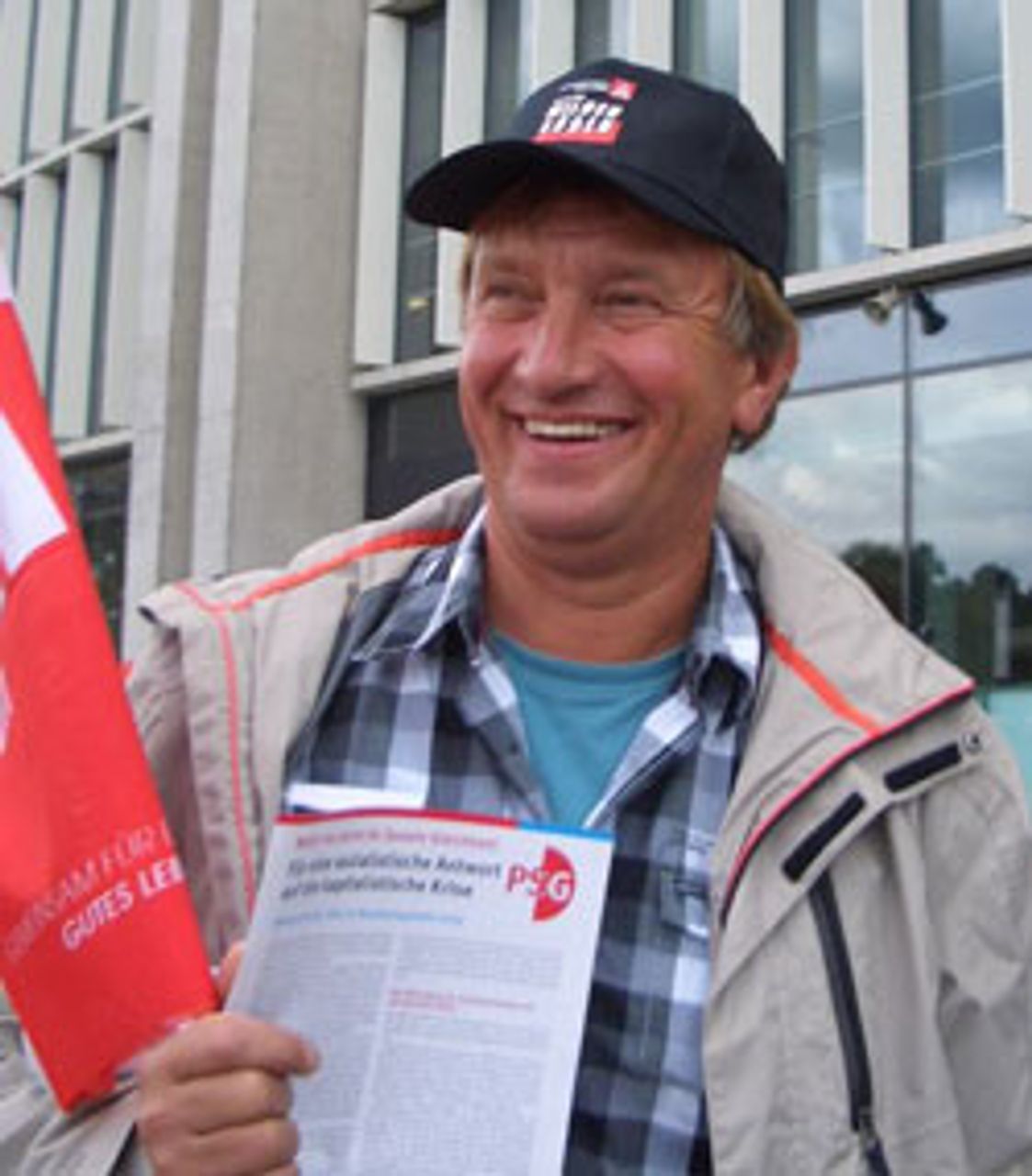 Alfred from Baden-Würtemberg
Alfred from Baden-Würtemberg“What disturbs me about IG Metall,” said Alfred from Baden-Würtemberg, “is their open support for the SPD. The SPD caused the whole mess. It started with the introduction of 400-euro-per-month jobs, something the SPD should have never allowed. Such measures are asocial and mean only exploitation and the wiping out of social gains.”
Alfred works at the Alno AG company, which makes kitchen equipment. He reported that the company had been restructured on several occasions in the last 15 years. “Every time we get a new executive committee there are usually dismissals a month or two later. They call it reorganization. We began with 2,400 workers in 1998. Now we have just 900.”
“The IG Metall has put on a spectacular show here, but it treats sub-contract workers badly,” Alfred continued. “The union should have recognized this problem long ago and put up a serious fight against it.”
He reported that sub-contracted workers at his own factory earned half the wages of regularly employed workers and the company management followed a policy of gradually replacing proper contractually employed staff by such sub-contract workers.
“I feel really sorry for the sub-contract workers,” he said. “They just come and go, as they are required. This cannot be allowed to continue. We should take to the streets, take strike action and paralyze the entire economy.”
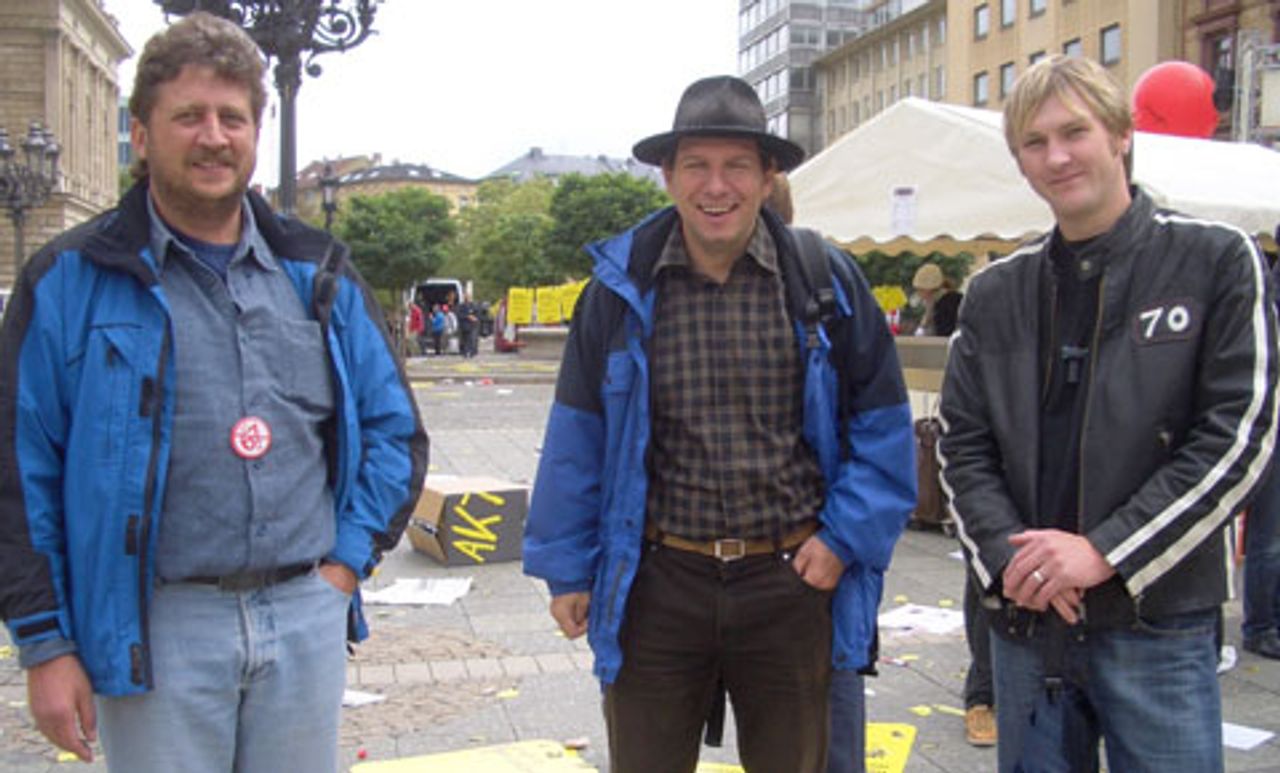 Christopher (left), Andreas and Wilhelm from Fulda
Christopher (left), Andreas and Wilhelm from FuldaChristopher, Andreas and Wilhelm travelled from east Hesse to Frankfurt and felt “something had to be done.” They work at Element Six in Fulda, a company with 4,500 workers worldwide. They related how employers were using the current economic crisis to implement attacks that had been planned long ago.
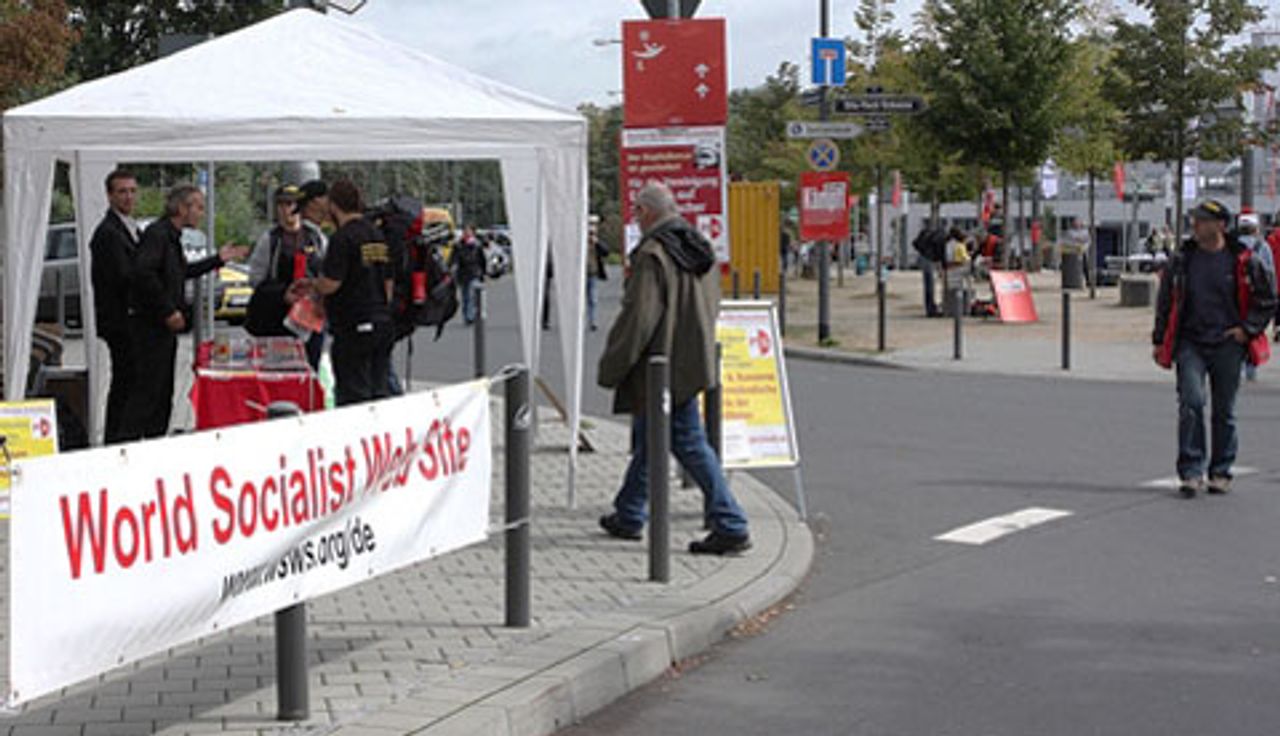 Information table of the PSG and WSWS
Information table of the PSG and WSWSOn the fringes of the rally, supporters of the Socialist Equality Party had set up a series of literature tables. The PSG candidate for the state of North Rhine-Westphalia, Dietmar Gaisenkersting, addressed participants via megaphone, drawing attention to the policies implemented by the SPD.
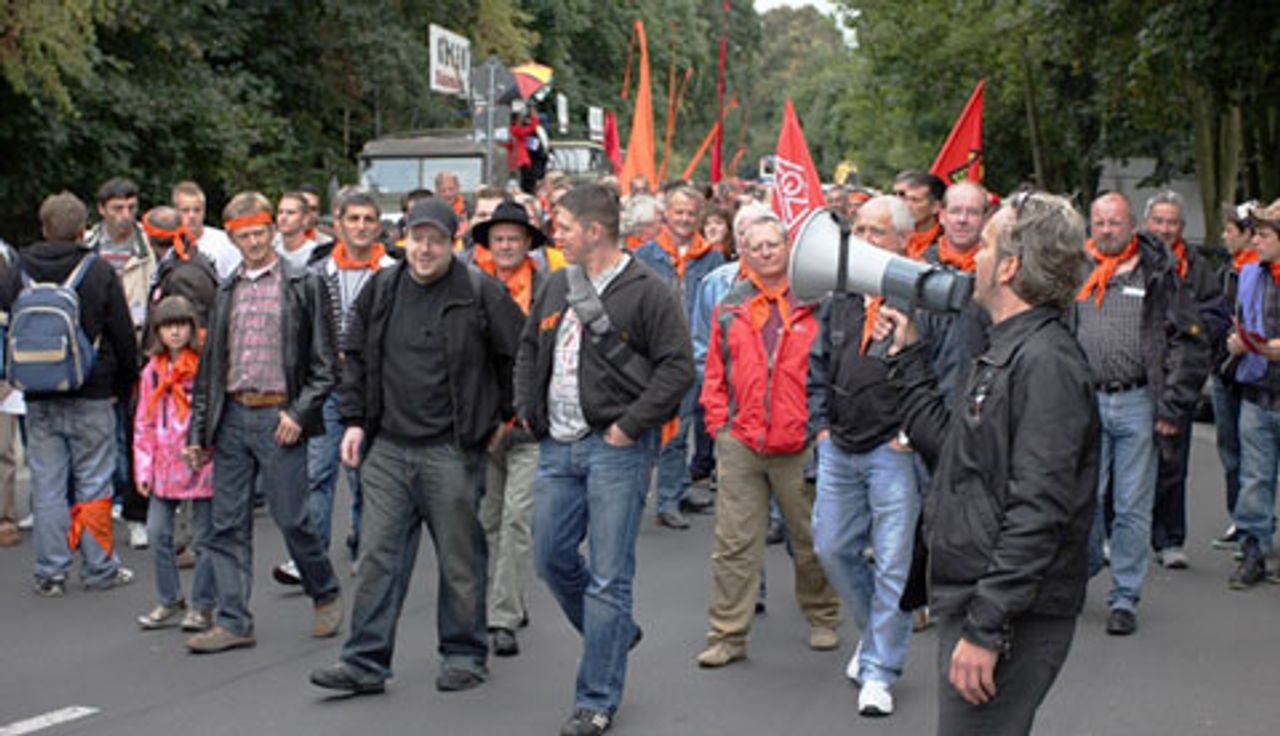 Dietmar Gaisenkersting addresses participants at the IG Metall rally
Dietmar Gaisenkersting addresses participants at the IG Metall rallyGaisenkersting asked: “Who is responsible for introducing cheap labour jobs? Who introduced Hartz IV? Who is responsible for increasing the pension age to 67?” He then continued: “It is above all the SPD together with the other governing parties in Berlin. The IG Metall wants to divert attention away from this fact with this stunt today. In common with all the other trade unions the IGM has done nothing against such policies in the past years. On the contrary: every cut in jobs and wages carried out in past years bears the signatures of the trade union and works council chairmen!”
He pointed out that the IGM and the Verdi service trade union were represented in the anti-welfare Hartz commission by no less than three functionaries. The PSG candidate continued: “The trade union and SPD leaders are jointly responsible for the poverty and misery, which they are now declaiming.
Gaisenkersting told participants: “The SPD and the Left Party have proved in the last few years that they have no intention of breaking the power of the financial elite. They would rather drive forward with attacks on the workers. Workers therefore need a new party! This party must be based on a socialist perspective, which puts the needs of the population before the profit interests of the financial aristocracy and major concerns. It must also be an international party, because the ruling elite is organized on an international basis and pursues an international strategy.
“We—the Socialist Equality Party—are such an international socialist party.”
Supporters of the PSG and WSWS handed out thousands of copies of the PSG election program at the rally. Many participants lingered at the PSG tables to find out more about the party and several gave their contact details, expressing their interest in building a political alternative to the old bureaucratic apparatuses.
Subscribe to the IWA-RFC Newsletter
Get email updates on workers’ struggles and a global perspective from the International Workers Alliance of Rank-and-File Committees.
